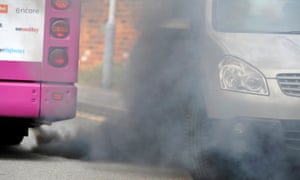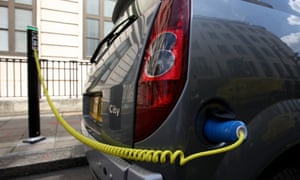
Excess diesel vehicle NOx emissions were linked to about 38,000 premature deaths worldwide in 2015. Photograph: Tony Margiocchi / Barcroft Media
When the story of Volkswagen’s cheating on diesel emissions tests broke nearly two years ago, a number of reporters asked me if this spelled the end for diesel cars. My response was a confident, dismissive “no”. While dieselgate would cast a long shadow, there was no reason to write off diesel cars, at least in the short term. After all, the technology does exist to make clean diesel cars. It’s just a question of improving the existing regulations and enforcing them better.
I was wrong.
Here is what we have learned in those two years:
First, we underestimated the depth of the deception that has been propping up diesel cars in Europe and elsewhere. Evidence from testing performed by several governments in Europe and elsewhere, as well as by outside independent organisations, confirms that huge numbers of diesel car manufacturers have been cheating, at least outside the US. Even more troubling, evidence is piling up that this cheating was not the result of misunderstandings of regulatory requirements, or honest mistakes by some engineers, but well-thought-out corporate strategies.
Second, the lowest-cost NOx emission control technology for smaller cars, the lean NOx trap, is inadequate to reduce diesel emissions from cars in the real world, and might have to be supplemented with additional after-treatment systems or abandoned entirely in favour of a better, but higher-cost, technology, selective catalytic reduction (SCR). Even then, SCR systems will have to be beefed-up from current designs. This is significant, because one reason manufacturers seem to have cheated is because doing the right thing cost more and would have made some diesel models less competitive on price. The revelation that German diesel car manufacturers might have colluded to under-specify the size of urea tanks in SCR system designs, among other things, is only the latest piece of evidence in this context.
Third, we know much more about the global health impacts of high real-world NOx emissions. A study published earlier this year in Nature, in which some of my colleagues at the International Council on Clean Transportation were involved, estimated that excess diesel vehicle NOx emissions – amounts greater than are already nominally permitted under regulations – were linked to about 38,000 premature deaths worldwide in 2015, mostly in the EU, China, and India. The study projected that the impact of all real-world diesel NOx emissions, both permitted and “excess”, will grow to 183,600 early deaths in 2040.
Fourth, the belief that diesel cars are necessary to meet fuel-efficiency standards and reduce CO2 emissions has been thoroughly debunked. Moving away from light-duty diesels towards improved gasoline, hybrid, and electric vehicles will actually lower the cost of meeting future vehicle CO2 standards. Diesels are not a bridge to a zero-carbon on-road transportation system, as some claim; diesels are blocking the path.
Fifth, the prospects of long-term alternatives to diesels have improved dramatically. The cost of electric-vehicle batteries has come down faster than most of us, me included, thought possible. Granted, electric vehicles are not yet competitive on cost, or on some other attributes mainstream consumers care about. But it now seems very likely that electric vehicles will be competitive across different market segments much sooner than anticipated.
And so here we are, not quite two years since the revelations about Volkswagen first came to light and set off a chain reaction. Industry has worked to impede regulatory changes that could bring the urgent problem of excess NOx emissions under control. Within weeks of dieselgate, manufacturers in Europe were lobbying to set conformity factors in the new Real Driving Emissions on-road test that would permit them to emit NOx at more than twice the regulatory limits even under the unrealistically narrow range of driving conditions that the test features. As a result, European diesel cars may not meet Euro 6 emission limits until 2024 – a decade of failure that will cost tens of thousands of lives.
In India, manufacturers are resisting early adoption of improved testing procedures and real driving emissions tests altogether. In Thailand, manufacturers are pushing to delay implementation of Euro 6 standards from 2020 to 2028. The list goes on. Even if Europe somehow manages to solve its problem of high diesel car emissions over the next several years, it is likely to persist for much longer in Asia and Africa unless something happens to change things.

No comments:
Post a Comment
Note: Only a member of this blog may post a comment.